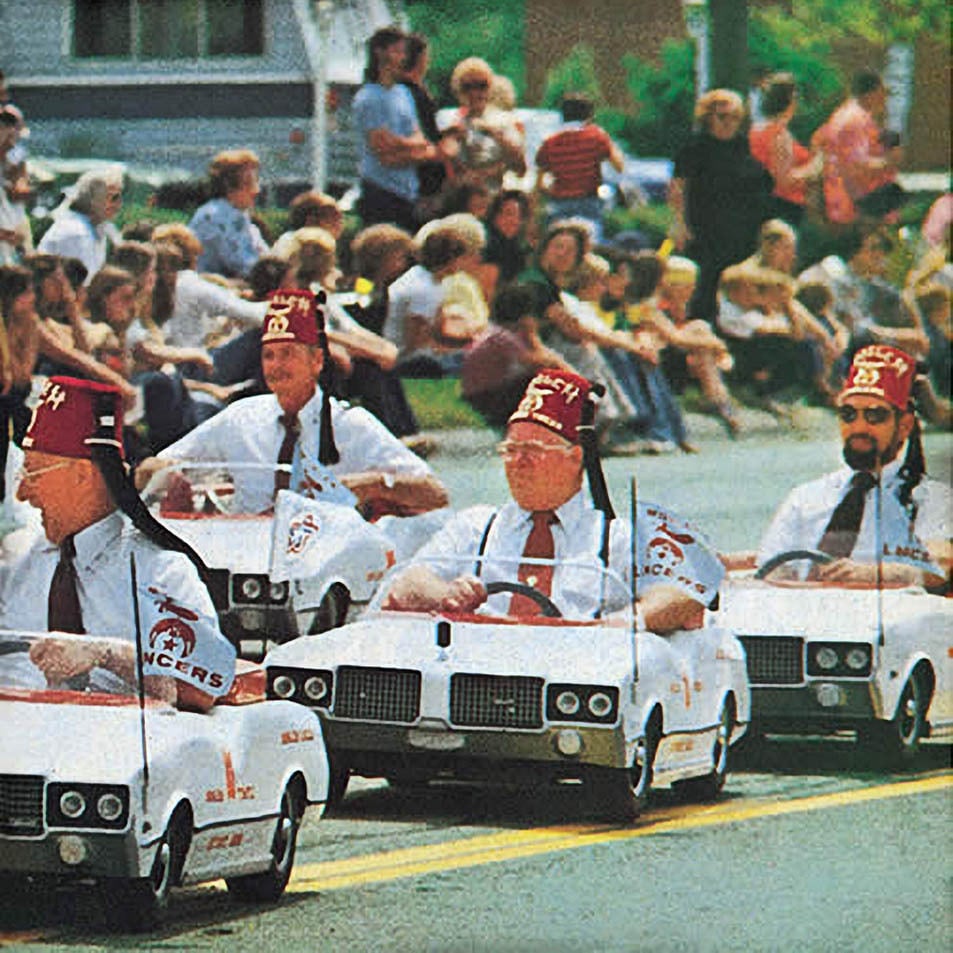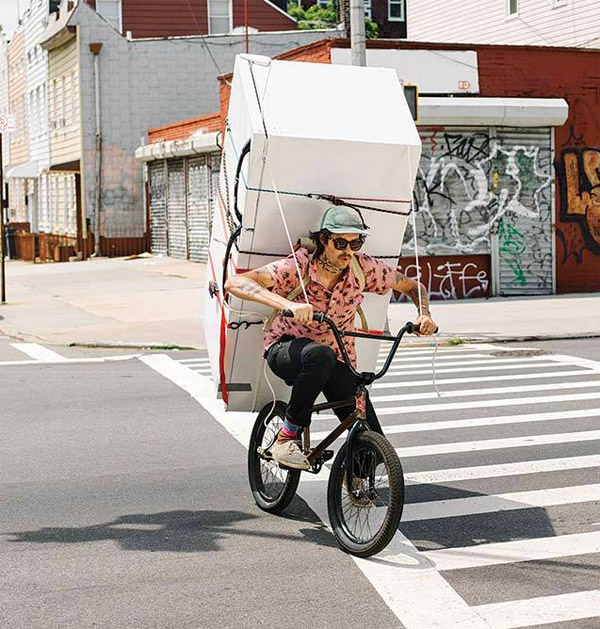Absolutely both are needed. I struggle to understand how people think a rural area with 5 minute drives between homes could be connected to a public transit network that is timely and not astronomically expensive.
Similarly, I struggle to understand why people think paying for roads to connect houses 5 miles away from each other isn’t astronomically expensive
Not sure who’s downvoting you, you’re absolutely correct. Infrastructure for rural, and even suburban areas isn’t even close to being paid for by the people living there. I thought this was common knowledge. It should be obvious that 5 families living in a single large building require significantly fewer resources than 5 individual homes 5 miles apart.
Rural people, and I get it: I grew up in rural Montana. But America doesn’t run on people like my grandpa driving 6A worth of corn to the grange any more. People like my grandma driving literally 7mi each way to the nearest grocery store isn’t sustain long term
Yeah, I’d love to live in my own mansion on an island and fly my private jet to work. But that’s not realistic if everyone waaaaaaaants to do it
Discussions like this are always a good reminder that area descriptions are different across the world. I live in what is considered a rural area here(in a small terraced house where houses where already there when the Ferrari maps of the Southern Netherlands where drawn in 1780…). Farms everywhere. Behind the terraced housing and small apartments. Still have a population density of 500 people per km². And our public transport is shit outside of the typical congestion hours. Personally I wish they’d both put tram tracks down again with a dedicated track cars can’t drive on and improve the cycling paths to be more safe. Guess I’m part of the problem driving an EV, but it gets me to work in 15 minutes. While with public transport it’d 90 minutes if nothing happens when I need to go from one bus to the other. And there simply are no safe cycling paths. (And no showers at work) Shopping I can do by bike or by walking though.
You don’t understand how minimal maintenance on roads is less expensive than the equipment and personnel to drive through it on a frequent basis?
That’s worrying indictment of the education system.
I’m not sure what your comparing here, but there are constant budget shortfalls for rural paving in my state. It’s not cheap. There’s also the cost to build the roads (and run electric, phone, internet, etc). There’s a reason we needed a bunch of subsidies to add services to rural (and even suburban) places. I think we owe it to everyone in our society to provide basic services, but we don’t have to pretend it isn’t expensive to do so.
https://www.strongtowns.org/journal/2017/1/9/the-real-reason-your-city-has-no-money
why would rural roads need to be paved, just lay gravel, or just flatten and pack dirt.
Actually I understand it just fine. My city alone has a $4.4B road maintenance backlog, and it’s not that big of a city
It’s cheap”er” to maintain roads. It is not cheap. Use Google next time
Actually I understand it just fine. My city alone has a $4.4B road maintenance backlog, and it’s not that big of a city
And how much do you think a transit system that is meaningfully comparable to cars would cost?
Edit: either big"I was told there would be no fact checking!" vibes from anonymous downvoters or sour grapes on my end., I guess.
To your edit: it’s the former
The taxes might be cheaper, but everyone on these cheap roads purchases their own car, their own insurance, wastes their own time in traffic, lives near nothing but a church an hour walk away, etc.
I’m curious so let’s explore this. Say someone in a rural area needs to drive 10 mins down the road a day and 10 mins back. Let’s say you employ one person for just 12 hours at federal minimum wage. That’s $609/week PLUS maintenance and gas on the bus. If someone owned their car/truck and paid maybe $2.50/gal with a 15mpg car, that would only be like $1.70 a day for them. (30mph20min/15mpg$2.5/gal*7(days)=$11.67). That community would only need 60 people taking the exact same path as the bus to make it worth it for them.
I’m all for public transit. I take it to work a few times a week and even when doing leisure, but it’s not a replacement for extra-suburb transit.
The problem comes when people who insist on living away from civilization demand the perks of civilization by being able to drive to a city and park their cars for free.
This becomes very expensive, and degrades the quality of life of those who live in the City.
well why are you living in the city?
If left to private companies, they can’t even seem to bring internet service 5 miles down a rural road. How the heck do you even imaging the whole road being a reasonable idea
Roads in rural new England are most often publicly funded, and are connected into a network of roads and are for transit, so rural roads are in fact a public transit network. I get that you mean trains and buses, though.
Rural roads are just expensive, period. Putting electric cars on them would additionally shorten their lifespan, so I fail to see how either public transit or electric cars are supposed to help. Plus, rural folks are not major emitters, so it doesn’t really make much sense to even try to find meaningful emission savings there.
Plus, rural folks are not major emitters, so it doesn’t really make much sense to even try to find meaningful emission savings there.
“On average, cities and large towns produce about four tonnes of CO2 per capita, compared with more than six tonnes elsewhere in the UK”
That is per capita my guy. They emit more per person, but when you’ve only got 5 families in 10 square miles, getting them to emit less is fuckall in comparison to everyone in a city emitting less.
Very few people ought to be living that way. I think it’s fine for those people to use ICE cars. I also don’t care very much if the tractors use fossil fuels.
To each their own. I don’t live in the boonies but I’d like to retire there with some nice land to work on etc.
You can have nice land to work on in rural village. Being miles from your neighbor is not a sustainable way to live. And probably not healthy for a social animal like humans.
Transit between rural villages and the nearest city is possible and has been implemented in other countries
You can have nice land to work on in rural village. Being miles from your neighbor is not a sustainable way to live. And probably not healthy for a social animal like humans.
I was at my healthiest mentally and physically when I lived that far from people and went weeks without seeing another person, so every time I see people say this I wonder if I’m actually human.
Hmm. Healthy for who?
I have no close friends and I couldn’t be happier. As a matter of fact, give me a cave, a phone, a single outlet and BAM. I’m good to go. I don’t want friends, I want to laugh at a stranger’s joke on the internet and I’m good.
That puts you at an extreme, where there are not many like you. So I don’t care if you have a gas car. But you should not stand in the way for most people to live more ethicaly, without a car. Support dense cities so there are plenty of pristine caves for hermits to live in.
I mean, yeah. Why not? I don’t want to live in a city, but if you give me a cave, I’m in.
I wish I wasn’t me. I really do.
I have no close friends and I couldn’t be happier.
But also
I wish I wasn’t me. I really do.
hrmmmm
It’s about five to one rural to urban now.
In America, it’s 5:1 urban to rural. https://www.census.gov/library/stories/2017/08/rural-america.html
And the threshold for rural is 500 people per square mile. So the 5 minutes to neighbor is at a rare extreme. https://www.census.gov/content/dam/Census/library/publications/2016/acs/acsgeo-1.pdf
You should know that the 2020 census redefines “urban” to increase the number of people/houses required (your article is from 2017). However, the US has urbanized more since 2010, so it’s still 80.0% who live in urban areas compared to 80.7% in 2010. To clarify, the population requirement for what constitutes an urban area doubled from 2500 to 5000 people, and that figure only dropped 0.7%.
You eliminate the rural area with 5 minute drives between homes. Japan has a much higher population density more generally, granted, and they do occasionally get older, offset, single homes that are miles from anything else. But they also have extremely rural villages with maybe 2000 people that are still about as rural as you can get and still go in for farming. Many other places (I would say, basically all of them?) do this as well, and not all of them have high population density. I think, almost definitionally, the land use I’m proposing has a higher pop density, but the style of development generally, you’d be hard pressed not to classify it as rural.
The solution here is to orient the land use radially. Also probably to use less land generally, but that’s a separate issue. Most land use in america looks like having 20 different farms, that are each like 3 or 4 miles across, sometimes with multiple plots, with each house being positioned as far away from the other houses as possible, usually somewhere along the edge of a plot, and then running roads out to each of them, sometimes dirt roads, sometimes paved, usually some combination of the two for higher use vs lower use vs private.
Instead of that, you do what people have been doing for centuries. You clump the 20 different houses together in one contiguous strip that’s placed along some sort of rail line or higher traffic road, and then you disconnect all the plots of land from the particular houses. Ownership doesn’t necessarily have to correlate with one plot of land vs another. Then you gain all of the benefits that entails, and if everything is laid out sensibly, then you’re only about 3 miles from your specific plot. Utilities become cheaper to maintain, emergencies like fires, medical problems, natural disasters, become much easier to deal with, you can start building some actual infrastructure, like, say, a rail line.
That becomes much easier to justify if you only gotta send that shit to like one concentration of 20 or 30 or houses instead of sending it to those 20 or 30 houses individually, most especially if that line is just passing through before heading somewhere else, which should generally be the case. Maintenance of that rail line also becomes less problematic compared to that of a road if we’re considering that this rural area is probably mostly going to be farmland that demands larger industrial equipment shipments, and is going to be shipping back and forth things like grain, bulk goods which would do much better to be shipped by train compared to most other forms of transit. Slap that together with a multi-daily passenger rail line that passes through it as a stop and you’re pretty much set.
If we were allowed to Sim City our way to goodness, I’d pretty much agree with you.
But my province, a fair chunk of that land is held and others aspire to it.
I mean, my answer doesn’t make any of those people happy, but it’s basically just, fuck those people, if there’s a correct way to do something, we should do things in said correct way, rather than capitulating to everyone’s half-baked propagandized idiot desires
I’m pretty sure this is the reasoning espoused by every autocrat in history, many of whom thought they were doing things for the better.
I mean, yeah, but the major difference is that they were wrong and dumb and I am correct
sounds more dictatorial by the minute
and I’m loving every minute of it jerry
Except we already have built it wrong. Maybe if the government bought all of those houses and re-zomed the land forbidding houses but we’re talking more than 10 million homes (probably WAY more) probably $4 trillion+ and that isn’t even accounting for building new infrastructure. Not to mention people would refuse to leave their land. Realistically this is probably a $50 trillion undertaking.
Money’s just an object. Just do maybe 3 or 4 five year plans, and you’d probably be able to get there. If they don’t like it, eminent domain their asses. I dunno. It’s not a real obstacle, to me, that they’re deciding to intentionally be obstinate and intentionally deciding to make all their neighbor’s QoL worse. Just an slightly smaller version of the problem where some iowan baron decides it’s their right to dump their 84 million people’s worth of pig shit into a massive pig shit lagoon, tainting 70 something percent of the water supply. Except in this case, people aren’t getting malaria and we’re not having water quality issues. Instead, they’re getting heart disease and increased risks of lung cancer from needing to drive everywhere, they’re having to work fruitlessly on road and utilities maintenance jobs for longer, and grandma dies maybe 10 years earlier than she would’ve cause she was 5 miles away and nobody was able to notice that she wasn’t coming out of the house.
It’s not a big obstacle to your theory in your mind. A lot of rural people would go to war before being forced to abandon their properties. It becomes a pretty big problem to reality then. And in some of the more rural areas the backroad dirt or gravel connectors are maintained by the residents. You should spend a couple of days exploring the upper peninsula in Michigan. You need at minimum an AWD vehicle with a foot of ground clearance. There’s honestly like one paved road.
I don’t live in a place like that, I live in a shitty suburb with no sidewalks or bike lanes, or even a shoulder on the road. You can’t go anywhere without a car, it’s deadly. But I do vacation in places like I was describing almost exclusively. And most of them would never move to a city. But you’d just force them? My politics are anti-authoritarian. If I understand you correctly, you would empower monsters to do heinous things to your own citizens.
Yeah, i would empower monsters to do heinous things to my citizens, like forcing them to live in a rural village where someone will care for them when they’re old, and their utilities layouts will make sense, and their cost of living and lifestyle footprint will massively decrease. Oh no! The horror!
Also, I dunno. ahh, they’ll go to war, how horrifying! whatever shall we do! How many of these people will actually go to war, though? That’s some shit that floats around a lot, but I realistically think that if you just kick someone into some situation that’s realistically better than what they were previously hucking, then they’d probably just take it. IF you really wanted to swing it, though, then you could just swing it all through the markets and then fuck them over that way, just like they’re already being fucked. Not many people actually have that killdozer gene in them, though, and they wouldn’t really have a good target. There’s no amount of “blowing stuff up” or “going to war” that can realistically bring back a, by it’s nature, highly vulnerable, detached development style like that, and blowing stuff up doesn’t really help you contest with whatever your current standards of living are.
Lemme ask you this, though. How do you think we should solve the problem of the suburbs? Do you think a market solution is going to operate fast enough? Do you think those solutions are going to solve the broader problems with the housing crisis popping up in every major city? Do you think they will be enacted fast enough to mitigate climate problems?
I struggle to think how you see a generic statement about improving public transit and immediately go to “but what about the places where it cant help?”
Well shit Einstein, I suppose this is just referring to places where it does then.
Your comment does nothing to support or contradict the idea we should improve public transport…
It was more about the “we need both” parts.
Though, dismissing the some half of the country that lives in rural areas is kind of why politics is what it is I guess.
Less than 20% of people live in rural areas in the USA.
Fair, but you add suburban about a third live urban. And realistically, connecting suburbs to a system that is anywhere comparable to cars is also pretty expensive.
True, but catering to people who make poor life choices also isn’t sustainable. Living in a rural area and having many kids are both choices. I few people should be able to make those choices, and should also be responsible for paying for them
True, but catering to people who make poor life choices also isn’t sustainable.
I’m super curious, do you know/realize that’s pretty much the conservative perspective on a bunch of issues (with which I also disagree.)
I don’t think it is, the conservative perspective is that you should have to pay to live, while this guy is just saying that you should have to pay to live the way you want if that way is expensive.
The problem with conservatism is that we are subsidizing people living in the equivalent of downtown penthouses in cost because it’s tradition, instead of the people in the streets.
I don’t think it is, the conservative perspective is that you should have to pay to live
Yes, and as conservatives see it, jobs are available and it’s on you to get one and support yourself and/or your family. If you can’t afford a family, it’s not on the state to subsidize yours.
Such is the conservative answer to addiction/homelessness, healthcare, education and pretty much everything else.
So my take is that there is a difference between saying “if you can’t afford to feed your family, starve”, and “if you can’t afford a lifestyle that’s decidedly much more expensive than that of most people, get a cheaper living”.
TBH in my perfect world, you would get free room and board in high density housing for free without stigma, and you could work to get something better. Does saying “I don’t want to pay to sustain people’s expensive rural lifestyles, I’d rather the money would go to help more people for whom not getting help means starving instead of moving” make me a conservative?
Improving public transit does nothing to impact rural area car travel. Saying we need both on a comment how we should improve public transport is replying to something not at task here.
Maybe you should look at the post again? I’m agreeing with OP who posted the meme with the note “Both is good” and I agreed.
Are you maybe confused and thinking you’re in a different thread?
The point is the post seems to minimize improve cars in favor of mass transit. The post didn’t start with we need both, it started with “get rid of cars” as the general sentiment.
Which is a fine sentiment in city centers, but that’s only a piece of things. Incidentally, I think the cities are generally trying to build out that transit.
Tiny cars is the only solution

I would unironically drive something like this. I’ve often wondered if I could make a street legal go cart.
Mandalorian armor suit with jetpack and climate control for me.
Corporate wants you to find the difference between these pictures

Miles per gallon. Or, in the case of the latter, gallons per mile.
“between 1.5 to 3 gallons per mile”, for those wondering
But what if one day five years from now you need to move 20 refrigerators at midnight and all the trains suddenly break down?
/s

Well, I would simply make 20 journeys with my Cybertruck. 10 would be pushing it. The weight of two fridges might snap the chassis.
Yeah, trains.
I swear this sub is the same thing repeated in different variations over and over
[looks at sub name]
I checked the sub again and it’s only the front page posts I see that aren’t any good, they’re just text post rants like this one, kind of like the Lisa Simpson template, not even a meme
Lisa needs braces
Mental plan?
To be fair, they are contributing something and it still brings awareness and discussion.
You’ve just described all of human culture.
But then how can we turn trillions of dollars by shackling people to an expensive automobile along with its repairs and insurance costs? How can we further exploit by forcing the use of these vehicles, thus requiring the purchase of their fuels and the use of asphalt companies to pave endless highways and streets? The public yearns to be exploited- no, it needs to be.
So, I don’t know if you know this or not, but a majority of people want their cars. Nobody is forcing their use. Roads exist because people want their cars, and they want to be able to get places in those cars.
I want my car the same way I want to go to work tomorrow.
This exactly. Do I want a car in the US’ current car-centric hell where taking a bus across town could take two hours? Yeah, absolutely. Would I want one in a US with robust public transit and micromobility infrastructure? Almost certainly not. It’s a constant financial drain and huge pain in the ass at every turn.
When people say we need to get rid of cars, we mean that we need to 1) build up viable alternatives to cars and in conjunction 2) stop letting the interests of cars dominate everything else. Car drivers in the US are actively given enormous privilege over every other mode of transportation. Businesses need to meet ridiculous parking minimums to ensure you can drop your giant metal box anywhere, anytime and for free, dramatically reducing walkability; speed limits are basically never enforced, speeding up car commutes but dramatically increasing the danger for those who elect for micromobility; ungodly amounts of transportation funds get funneled into unsustainable road projects while public transit starves; car companies are deliberatelly allowed to skirt environmental regulations by selling even less environmentally friendly trucks and SUVs; and basic traffic calming measures are given ridiculous thresholds like “Have X number of people died here yet?”
If you start taking away the insane privileges that are afforded to and often even mandated for cars, you make way for other means of transportation to grow and become the optimal choice for most people. Some people will still use cars because they need to or want to, but even those people will use them less frequently.
I want my car, and I want 100 others. I just can’t afford all the cars I want. Most of the people I know also want more cars or sportier, more expensive cars.
So, in your view, a car is more like an accessory than a mode of transport.
It’s an enabler of more. It allows me to transport me and my family to the movies when we want, it allows us to go camping, it also means we can easily traverse many shops and buy what we want without having to worry about how to get it home, etc.
When we buy groceries, we buy them in bulk and keep meats in a freezer out back, so it’s easy to transport a whole trunk-load of groceries home.
It’s as much as an accessory as that too. It’s like clothing. I like my small 2 seaters, and as a family we like to drive around and play ingress/pokemon go, together.
Do they want to get to places on those cars, or do they want to get to places and cars are the only (or only practical) way?
They want to get places in those cars. Why do you think everyone “goes to work”? They go to work, because … they’re providing a service for people who are…
dun dun dun…
Driving cars to the places they want to get to, for commerce. This shit isn’t mandated. You don’t HAVE to own a car. Everyone WANTS to own cars.
This shit isn’t mandated. You don’t HAVE to own a car. Everyone WANTS to own cars.
Terminal case of carbrain. I feel like I just stepped into a 1960s Ford Motors propaganda film reading this comment. Like I’m reading the perspective of someone who’s never set foot in a city with functional public transit/micromobility infrastructure and walkability in their life, or if they have, they tried to shoehorn their obnoxious 2019 Child Crusher AWD SUV into it and either completely missed out or actively blamed the objectively safer, more efficient, more pleasant infrastructure for impeding on their ability to go vroom vroom.
You’re out of touch with reality. Go talk to a normal person sometime. Like, face to face. Not in your internet echo-chamber.
As a mid-westerner, cars and driving is in my culture and DNA. For many of us, cars are our freedom machines, the only way to move on in life, the only way to get anywhere. I love to drive and I can drive almost anything. What I don’t like, is having to drive to survive, having to constantly be in a hurry.
Im pretty anti car but I do like having the option that is my own. I just want my driving to be like the used car salesmans little old lady that used it briefly once a week. Im one of the few anti car that want to make it more a choice so that they can be kept parked as much as possible.
Same, I really enjoy driving in rural areas across long distances with low traffic. I hate driving in cities.
Any time I go to a city with a decent subway/metro/light rail line that is my first choice if possible. Or walk, since a lot of city downtowns are very walkable, especially compared to rural areas and spread out midwestern towns woth barely any shade trees.
A majority of heroin users want heroin too. Roads exist because people want to go places; they preceded cars by a couple thousand years
“But i really waaaaaaaant it” isn’t grounds for policy making
It really is though. Why do you think Marijuana is being legalized? It’s because “I really waaaaaaant it”…is literally grounds for policy making.
Last I checked, cannabis was still DEA Schedule 1 fully illegal, despite a majority of Americans wanting it.
See also: abortion, campaign finance reform, ranked choice voting, and so on.
American policy isn’t decided by the people, it’s decided by the people in power, and the people in power make money by keeping us tied to inefficient transportation
You really are taking this stance, purposely ignoring the progress made on Marijuana?
Really. Evaluate your life. If you can’t even have a discussion in good faith, what are you doing?
The abortion issue came because nobody considered the circumstance we’re in where the supreme court would upright and turn over 30+ years of settled law. Inroads are being made on turning it back - as abortion access was always (historically) a lever that government controlled in order to be able to control population incline/decline. We’ve moved forward with our thinking and regard it as a human right now.
Just admit that “I really want it” is absolutely a valid reason for policy change. You got something wrong, it’s fine. We all do sometimes. Unless you’ve got MAGA-brain.
pragmatically we should do both. we know no matter how much we scream or wish it that cars are not going to go away but we can expand transit and we should move as many autos and such to electric.
Ah, I see that Moo Deng has infiltrated the fediverse, welcome queen
During WWII they invented the concept of gross domestic product to quantify a country’s ability to wage war. The higher the GDP, the bigger the military it could support.
GDP is a measure of how much economic activity there is. If I pay you and then you pay someone else and then that person pays me the same amount we’ve increased the GDP without actually doing anything. So the US, knowing this was their key performance indicator, set about increasing GDP.
So they make everyone buy a car, then gas, then service, then insurance instead of building rail infrastructure. The same goes for child care: If you make it so both parents have to work and pay someone else to watch their kids that’s a much bigger boost to GDP than one or even both parents being able to stay home and raise their kids. Having everyone in a suburb have to buy their own lawnmower and trimmer and grill and stove and washer/dryer and dishwasher also boosts GDP way more than sharing things.
Plus there’s the fact that cars require a lot of the same technologies and factories as a lot of war materiel. If we were ever to be in another global conflict we’d need to build all the guns and trucks and uniforms at home, and without a strong car industry we’d have to start a lot of that from scratch.
But we’ve got the biggest GDP in the world so I guess that’s something.
Thank goodness the UN and the World Economic Forum have started talking about replacing GDP with a measure of economic activity that takes human well-being into account. That was one of the points at the Summit of the Future a could weeks ago. Better late than never.
You’re kind of right that GDP is strictly a measure of economic productivity, and a lot of people look at it to represent a lot of other things like the size of the economy, the health of the economy, how well citizens are doing, etc.
However, you are dead wrong on this point:
If I pay you and then you pay someone else and then that person pays me the same amount we’ve increased the GDP without actually doing anything.
It’s possible that, you’ve “increased the GDP without actually doing anything” if you’re each not doing anything actually useful (see the broken window fallacy). However, in most case, each of those steps resulted in a useful service or product.
However, in most case, each of those steps resulted in a useful service or product.
I dunno if I’d say that, really. “useful service or product” is inferring a lot about the context in which these transactions are done, it doesn’t really open up the box, there. Is gambling a useful service to have access to, for instance? What about, say, setting everyone about buying a big suburban house, a car, running out a ton of asphalt to these places, putting out utilities to them that are both financially insolvent in the abstract and also take up too many resources for what they are? Like, I dunno, if we’re considering the alternatives, there, which incur much less consumption, and thus, much less trade, the alternatives that cost a whole lot less, I would say that the idea that this is a useful measurement really at all begins to totally fall apart. I dunno. I maybe wonder if, say, free healthcare might be thought to decrease the GDP of a country simply because less money is being thrown around.
If I pay you and then you pay someone else and then that person pays me the same amount we’ve increased the GDP without actually doing anything.
Wrong. This transfer of funds would be taxed in some form or the other. GST if u r a registered business. If u aren’t, it would come under personal income tax. Therefore, it would not be profitable for you to do this money exchange without expecting something in return. If you say that you simply enjoy seeing cash change hands, then u r generating value. U r getting pleasure in return of doing this experiment. Soooo that does come under GDP.
Now of course, GDP shouldn’t be the only metric you judge a country by. It’s clearly very flawed in measuring stuff like quality of life per person, wealth inequality and so on. However, it doesn’t mean that you should completely ditch it either. It certainly has its use case when trying to understand the economy of a country.
Wrong. Most jurisdictions have Value-Added Taxes, including I’m pretty sure all places that call their sales tax GST (Goods and Services Tax). In the given scenario, as long as the businesses were making those purchases (as business expenses), they would take the taxes paid as ITCs (Input Tax Credits), and be left will a GST bill of NIL.
Source: Here’s Canada’s info on ITCs. It’s pretty similar in other jurisdictions.
Man I really wish all that conspiracy rambling was real. As misguided as it would be, it would show a ruling class with political direction and effectiveness. I’d be happier if that was the reality - even if everything you said was true - over the mindless chickens we have wandering around our collective political landscape.
A bunch of mindless chickens chasing GDP would have the same effect
Two things can be true.
We should reduce our dependence on cars. Also, our vehicles should be Electric. Ine dos not preclude the other and so saying we shouldn’t do one because of the other is a fallacy.
Hehe cute hippo
Look, I’m not about to take transportation advice from a river mammal that enjoys showering its neighbours with faeces using its helicopter tail.
That being said, he’s not wrong.
The entire society is designed and structured specifically so that you need a car, its a bug, not a feature.
The more cars you have, the more you require cars.
we most certainly do not need both. if we did the latter successfully, we should be getting rid of most gas cars, and replacing only the remainder. having as many cars as we have now is bad for a multitude of reasons beyond that they’re mostly burning gas.
wow, i really didn’t expect ‘there should be less cars’ to be such a divisive stance on c/fuckcars
Those still rely on gasoline.
No thanks, I’d rather just skip to banning cars
Someone will counter with “but the US is really a big place …” and you’ll have a completely counterproductive argument.
Or you could focus on better alternatives to cars. When that works, focus on better alternatives to more car uses. When that works, focus on whatever people keep using cars the most for
and what alternative to cars (other than ATVs and private planes) can work outside of citys?
Trains, they can be called upon and carry larger machinery than trucks
It’s inside cities that those are inefficient
















